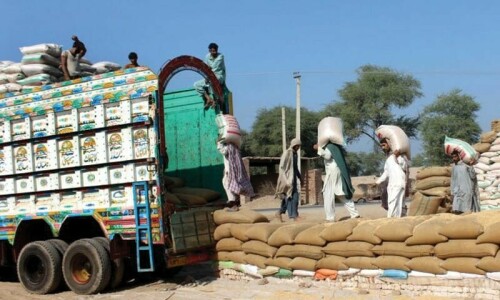LAHORE, April 24: The Punjab Information Technology Board (PITB) has launched four citizen-focused projects to digitise and improve services of City District Government Lahore (CDGL), for setting up of 100 model police stations, development of Disease Surveillance System to check any epidemic at its initial stage and automation of Lahore High Court cases.
Information Technology has an effective role to play in transforming the existing broken management systems into efficient management systems in the public sector.
PITB Chairman Dr Umar Saif is optimistic about the success of the projects, and says that, with an allocation of some Rs2.5 billion, the board has the resources to carry these schemes through.
Dr Saif, who was earlier teaching at the LUMS and has recently received the Google Faculty Research Award, says the board was automating all services offered by the CDGL including provision of certificates issued for births, deaths, marriages, completion of houses, as well as for installation of streetlights, water and sanitation services.
At present, he says, the citizens find it tough to get the correct information and quite often do not even know the cost of a certificate that they require: The fee for a marriage certificate was Rs40 but people were being forced to pay up to Rs5,000 for one. “Standard Operating Procedures are being framed to ensure that all relevant information is readily available to people. The customers will now be issued a receipt mentioning the actual charges,” Dr Saif tells Dawn.
He says all consumer applications with the CDGL will be easy to track, while the government would proactively inform citizens about the status of their applications for a service. A chief minister Vigilance Cell would call applicants randomly for feedback. “This information will be collected and would be available on CM’s dashboard,” Dr Saif says.
The CDGL services automation is being executed under a World Bank-funded “Proactive Governance” project. Locally, this project is known as Citizen Feedback Model.
MODEL POLICE STATIONS: In a major intervention to reform the police department, Dr Saif says the board is working on establishing 100 IT-enabled model police stations. At present, he says, the PITB would automate every visit of a complainant and details recorded in ‘roznamcha’. The information would also be available online.
The PITB would provide computers equipped with specifically designed software and post IT staff at each of the 100 model police stations.
Five CCTV cameras would be installed in each police station – in SHO room, in investigation room, in both male and female lock-ups and at the entrance gate.
All the data generated in a police station would reach Central Command Centre, from where the police stations’ working would be monitored. The staff would call the complainants randomly and ask whether they were satisfied or there were complaints against the policemen including asking for bribe.
The PITB has outsourced the functioning and protection of CCTV cameras, at a monthly fee.
HEALTH: Dr Saif says the PITB would monitor disease patterns and outbreaks. Currently, he points out, there is no Disease Surveillance System for timely intervention that could lead to alerting the relevant authorities about a disease outbreak in a specific area.
“The PITB partners the Centre for Disease Control (CDC) in Washington, USA, to monitor development of any disease into epidemic,” he says.
In Punjab, Dr Saif says, there are 253 hospitals including teaching, district and tehsil headquarters hospitals. The PITB would post its Data Entry Operators in these hospitals, who would feed each patient’s disease as well as CNIC and cell phone number. “This data will be used to create locations on a geographical map. The map would help to forewarn the authorities about a disease at least a couple of weeks in advance.”
The PITB chairman says this surveillance system is currently being used in monitoring dengue outbreak. Besides hospitals, he says, around 1,500 dengue brigades (officials) equipped with GPRS phones are taking pictures that are uploaded instantly. “In emergencies, the government will be able to quarantine red-alert areas,” he said.
LHC: Dr Saif says the board is designing a case management system for the Lahore High Court. Already, the lawyers have started receiving SMSs about the case schedule and in a month’s time, the litigants will also begin to get these messages.
The bailiffs would also be given GPRS devices and their movements would be monitored.












































Dear visitor, the comments section is undergoing an overhaul and will return soon.